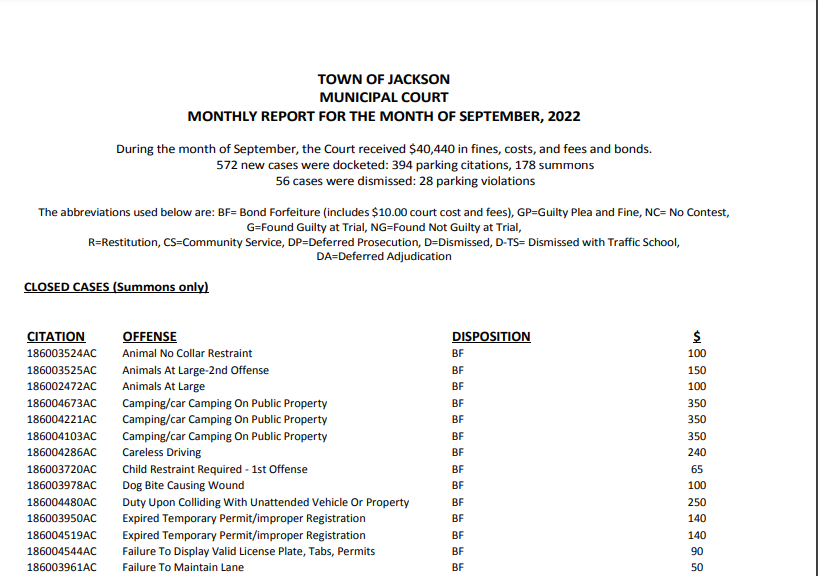Jackson Municipal Court Stops Publishing Names of Defendants Online
Questions raised about transparency
Nov. 1, 2022
By Shen Wu Tan
Special to the Wyoming Truth
Every month, if you wanted to find out who had been convicted of driving under the influence, battery or other misdemeanors in Jackson Municipal Court, all you had to do was look it up online at the town council’s website, www.jacksonwy.gov.
Pictured above is the monthly report from the Jackson Municipal Court for September. The report no longer lists the names of those convicted of misdemeanors. The public must now request the information from the municipal court. (Courtesy photo via the Jackson town council’s website)
Not anymore.
Now, as a result of a change that was made without notice, you must make a written request in person, by email or fax, and pay $10 by check, cash or card. You also have to know the name of the defendant and their date of birth or the citation number of the case.
Nonetheless, court officials say they welcome inquiries. “The municipal court is happy to provide public information on cases and their dispositions,” Jessica Chitwood, the municipal court clerk, told the Wyoming Truth. “If a case is already known to exist, and only disposition information is requested, we are happy to provide that as well.” The citation numbers and types of crimes are still listed in the reports online.
But with the unannounced change, it is difficult to find out who committed crimes that have been handled in the municipal court, unless you already know who the defendant is or the citation number for the case. To pull up the report, you go to www.jacksonwy.gov, and from there, you click on Agendas & Minutes. Then you scroll down to Most Recent Events and click on Town Council Regular Meeting. After that, you click on the Municipal Court Report for the month.
For September, the most recent month available, the municipal court logged over 500 cases of misdemeanor crimes, such as speeding, public intoxication, public urination, prohibited use of cell phone while driving, camping on public property and marijuana possession. The cases that have gone through the court were resolved in a variety of ways, such as with a guilty plea, dismissal, deferred adjudication or bond forfeiture. The town collected over $40,000 in fines, costs, fees and bonds.
Some court observers, when informed by the Wyoming Truth of the change, raised concerns about transparency.
“The question is, ‘You’ve done it [published the names] before, so why not do it now?’” said Bruce Moats, a Cheyenne attorney. The change “takes away information that the public would otherwise have, in my mind, without a sufficient reason to do so...I see it as a part of a broader pattern of just information that was public being now restricted or being more difficult to get to.”
“I believe in a democracy – the more information the public has, the better, simply put, unless there’s a darn good reason not to,” he continued. “The courts need to be open…We’ve seen from history that historically closed courts have not been a place where justice was done...I thought for a long time that a lot of progress in government transparency was being made in the state. In recent years, I found that to be going in the other direction.”
The change in practice, which was discovered by the Wyoming Truth, was apparently made in May but not voted upon by any particular body.
Chitwood, the municipal court clerk, said that while attending a statewide municipal courts meeting in the spring, she learned that some courts do not publish defendants’ names online. She said she brought this to the attention of the judge and Jackson’s legal department.
Susan Scarlata, the community engagement specialist for the municipal court, subsequently told the Wyoming Truth that it was a “staff-level decision” made by the municipal court judge and town attorney. She estimated the monthly court reports have been posted online for about eight years.
Scarlata added the decision to remove the names was made due to “professional development and learning best practices from peer communities.”
Municipal courts in Sheridan and Cheyenne, for instance, follow similar practices and don’t post names of defendants online. In those municipalities, the public must request records through the courts.
Michael Krampner, a retired lawyer from Casper, acknowledged that the municipal court of Jackson could do more to allow voters and taxpayers to have access to records by publishing names online. But he noted that it does not appear to be “actively frustrating that purpose so long as the names are otherwise available.”
“Access to records is about allowing those citizens and voters who want information so that they can make intelligent political choices have the information,” Krampner told the Wyoming Truth. “So long as the information is available upon request and not hidden or withheld from the public, that purpose of access to records is met.”
He added, “The Wyoming statutes generally take the view that information is available if a person requests it and is able to receive it for a reasonable fee in a reasonable time and the courts are not required to post the defendants' names online.”
Chitwood said the court was concerned about publishing names of defendants whose cases later are expunged.
“This is a newer issue since towns and cities are now using their websites for publishing council meeting information,” Chitwood told the Wyoming Truth.
But Moats said, “You can’t shut off public information” because someone might be expunged later.
Christopher S. Leigh, the municipal court judge for Jackson, did not respond to multiple requests for comment. Leigh was appointed as municipal court judge in February. The town attorney, Lea Colasuonno, also did not respond to requests for comments.
Chitwood said the names that had been published online were included in a monthly report that the court provides to the town council; its members review what funds have been deposited from the court cases in the form of fees and fines.
“The purpose of the monthly court report is financial,” she said. “This report is actually submitted to the treasurer and then copied to the council.”
The Wyoming Truth reached out to all three Jackson town council members, the mayor and vice mayor for comment.
Hailey Morton Levinson, mayor of Jackson, and Arne Jorgensen, vice mayor, did not respond to requests for comment.
Two members, Jessica Chambers and Jonathan Schechter, declined to comment on the policy change.
Jim Rooks, the third council member, told the Wyoming Truth that he reviews the monthly reports as a financial document, but also as a way to study law enforcement trends.
“I have made requests to gain access to month-over-month, as well as year-over-year data to determine trends in local behavior [i.e. DUIs, driving while texting, speeding, etc.],” Rooks said. “I am far more interested in this data and resulting patterns than individual names.”
The Wyoming Truth is a nonpartisan, nonprofit news operation dedicated to helping the community and fighting for the rights of local citizens. To sign up for a free subscription, or to make a donation, please go to www.wyomingtruth.org. Other media outlets are free to run this article as long as they credit the “Wyoming Truth.” If you have any tips about this issue or others, or for more information about the Wyoming Truth, contact us at info@wyomingtruth.org.

